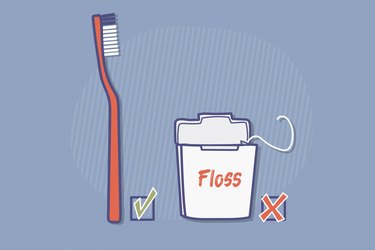
Typically, wisdom is welcome. Not so when it comes to wisdom teeth: When these four teeth in the back of your mouth arrive (or, in dental terminology, "erupt") it often leads to pain.
Find out more about why wisdom teeth — aka third molars — so often cause problems, along with the best ways to manage any pain and discomfort.
Video of the Day
Video of the Day
What Causes Wisdom Tooth Pain
First, a bit of background. Your wisdom teeth are the last adult teeth to erupt in your mouth, arriving in your late teens or early 20s. You can have up to four of them, one in each corner, located behind your first molars (which arrive around age 6) and your 12-year molars.
"Unfortunately, most mouths do not have room for wisdom teeth," says board-certified oral and maxillofacial surgeon Christian A. Loetscher, DDS, of Atlanta Oral and Maxillofacial Surgery and Dental Implant Center.
For your ancestors, thousands of years ago, living in pre-agricultural times, this third set of molars was essential. Dr. Loetscher explains: "[They] ate mostly rough food that had dirt in it and was abrasive to teeth. By the time these people were in their early teens, many of their teeth became worn down or broken off."
For them, a third set of molars was a useful trick, giving people a fresh set of teeth in what was then the likely last (and presumably wisest) decade of their lives, Dr. Loetscher says.
Now, when we live longer, maintain our dental health and have a softer, more manageable diet, extra teeth no longer serve any good purpose — in fact, they often lead to negative consequences, such as:
- Crowding: Without enough space for them to fit, wisdom teeth can come in sideways, Dr. Loetscher says. "They can push on the other teeth during your teen years, causing crowding," he says.
- Tooth decay: Sometimes wisdom teeth are deemed "impacted," which means they don't fully erupt in your mouth and may arrive with an odd angle, per the Mayo Clinic . Simply put, they're stuck. But even if wisdom teeth are fully erupted, they're prone to decay and cavities because they're so far back in your mouth that these third molars are a struggle to brush and floss, says David Moyer, DDS, MD, an associate clinical professor at the University of New England. "Eventually most people get cavities on them, or have pain and need them removed. An exception may be if you are congenitally missing some teeth and there may be room for your wisdom teeth," Dr. Loetscher says.
- Infections: Due to a lack of space, pockets can appear in the gum, Dr. Loetscher says. There, "food, bacteria and plaque accumulate and develop long-term inflammation and infections," he says. These infections in your mouth have the potential to be serious, even life-threatening, because infections can cause swelling in your throat and airway, preventing breathing, he says.
- A cyst can form: "All teeth develop in a sac or bag," Dr. Moyer explains. When the tooth comes fully into the mouth, the sac breaks. "But if the tooth doesn't come fully into the mouth, it can form a cyst around it known as a dentigerous cyst, and that can erode the jaw," Dr. Moyer says.
The bottom line is that wisdom teeth can lead to pain — this can occur in the back of your mouth, cause headaches or make the muscles on the side of your jaw sore, Dr. Loetscher says.
So, Should Everyone Just Remove Their Wisdom Teeth Right Away?
Given the pain wisdom teeth can cause, it may seem natural to want them out of your mouth, ASAP. But that’s not necessarily the best path — or necessary.
“Each situation is different and should be evaluated individually,” says oral and maxillofacial surgeon Anthony Cuomo, DDS, incoming Vice President for the New York State Dental Association, who practices at Northeast Implant & Oral Surgery.
Expect your dentist to take a medical and dental history along with X-rays, he says. Your age is also a factor: “The older the patient is, the more difficult the surgery may be,” Dr. Cuomo says.
Bottom line: “Not all wisdom teeth need to be extracted,” Dr. Moyer says. If there’s space for them to erupt, and it’s doable to keep them clean, they can stay put, he says.
4 Ways to Manage Pain From Wisdom Teeth

As you've seen, there's a lot of potential for wisdom teeth to cause pain as they erupt. Here's how to manage it:
1. Try Ice
Applying an icepack can help ease pain and discomfort, Dr. Cuomo says. (But note he describes this as a helpful tactic while you wait for an appointment for evaluation with your dentist — not a long-term solution.)
2. Rinse With Saltwater
A saltwater swish and rinse can be helpful, Dr. Cuomo says. Combine hot (not boiling) water with a teaspoon of salt, then swish it around the tooth, per the Oral Health Foundation.
Repeat the saltwater swish several times each day.
3. Take Pain Relievers
While over-the-counter painkillers can be helpful, this is a short-term tactic, according to the Oral Health Foundation.
4. Get Help From Your Dentist
Don't delay on reaching out to your dentist and detailing what you're feeling.
"Everyone's situation is different, and your dentist will advise you on how to manage your discomfort and get you an appointment," Dr. Cuomo says.
When it comes to teeth, a wait-and-see strategy is rarely the way to go — the pain points to a problem, and remedies like painkillers alleviate that symptom without fixing the underlying issue. Dr. Moyer describes them as being "finger in the dike" solutions — temporary stopgaps, not long-lasting remedies.
That's true for antibiotics, too, Dr. Moyer says: Prescribing them will get rid of the infection, but not tackle what's causing it. The antibiotics will make you feel better, but they're not a solution, he says.
So, if you're wondering when to see your dentist for wisdom teeth pain, Dr. Cuomo has a simple answer: "As soon as possible!"
Your Health (Not Dental) Insurance May Cover Wisdom Teeth Removal
Around 76.5 million adults in the United States do not have dental insurance, according to a 2021 report from CareQuest Institute for Oral Health. If you’re part of that large group, you might be feeling hopeless at the thought of dental surgery.
But you may be covered through your health insurance, if you have that, Dr. Moyer says. (Explore tips for finding affordable health care.)
“Not a lot of people realize that if wisdom teeth are impacted, typically the removal of [the] wisdom teeth is covered under your medical insurance, not your dental insurance,” Dr. Moyer says. Oral surgery is a specialty involving both dental and medical knowledge, he says, noting that he went to both dental and medical school, as is true for many oral surgeons.
4 Ways to Manage Pain After Your Wisdom Teeth Are Removed

If you have pain or infection due to wisdom teeth, removing them typically resolves it, Dr. Loetscher says. And even better news: "Nowadays this can be done in a mostly comfortable way," he says. That is: You'll likely be asleep during the procedure.
It's afterward, when the anesthesia wears off, that you may experience pain.
"The amount [of pain] will vary depending on the position of the tooth and the relative presence of active infection in the area," Dr. Cuomo says. Keep in mind, if your wisdom teeth are impacted (that is, not fully emerged) getting them out may involve cutting your gums and removing bone, Dr. Loetscher says.
The person who removes your wisdom teeth — whether it's an oral surgeon or dentist — will share tips before sending you home. Some recommended pain management strategies include the following:
1. Over-the-Counter Pain Medications
For up to 12 hours after the surgery, you won't feel any pain due to the lingering effects of local anesthesia, Dr. Loetscher says. "This gets you through the first part of the day afterwards with minimal discomfort," he says.
Once it wears off, you can turn to an anti-inflammatory painkiller (think: ibuprofen) to manage the pain, he says.
When it comes to managing pain, you'll need to be thoughtful. On the one hand, you should only take medication if you need it, Dr. Moyer says. But on the other hand, if you delay too long, "you'll have to climb over this pain hill," he says. Once you hit that stage, "the pain becomes very, very intense," he says.
2. Prescription Pain Medications
It's fairly typical to get a prescription for a narcotic after your wisdom teeth are removed. (Think: Vicodin or Percocet.)
"Narcotics may be needed for a day or two," Dr. Loetscher says.
But use them sparingly and only as needed, as it's possible to become addicted to these types of medications.
3. Try a Jaw Bra
"I send patients home with something called a jaw bra," Dr. Moyer says.
Using velcro, it wraps around your head and has little sleeves that you can slide ice packs into, he explains. (You can purchase this type of face pack online; $18.99, Amazon.)
Using it will provide you with both compression and cold, which keeps the swelling down and in turn can reduce pain, Dr. Moyer says.
"The use of cold packs intermittently for the first 24 to 36 hours will also help reduce any discomfort and swelling," Dr. Cuomo says.
4. Elevate Your Head, and Eat Soft Food
Other ways to reduce pain and inflammation include keeping your head elevated and sticking with soft food (your post-surgery recovery is not the time to crunch on an apple). The best foods to eat after wisdom tooth extraction include soup, scrambled eggs, smoothies and soft, well-cooked veggies.
And take heart: It might not be very comfortable to recover from wisdom teeth removal. But it won't take too long. "Typically it's a three- to five-day course of recovery," Dr. Moyer says.
The first night can be rough, but by the third or fourth day, you'll be able to get back to your usual routine, Dr. Moyer says. That's why so often surgeries are scheduled for Thursday or Friday, he points out — by the time Monday rolls around, you'll be ready to return to work or school.
Related Reading
When Should You See a Dentist for Wisdom Teeth Pain?
In general, pain is like your body sending up a flare that something needs attention. So if you're in pain, follow up.
That's true even if it's fleeting. Often, Dr. Cuomo says, patients say they experienced wisdom tooth pain that came and went over a few months, but they thought it was OK because the pain dissipated. Not so, he says. "The episodes of temporary pain were most likely subacute manifestations of a chronic infection," Dr. Cuomo says.
It's wise for parents to have their kids see a dentist or orthodontist in their early teens and have their wisdom teeth evaluated, Dr. Loetscher says. Getting wisdom teeth dealt with at a younger age leads to an easier, speedier recovery time.
It also helps you avoid the dreaded "dry socket," which occurs when the blood clot covering the extraction site breaks down, causing bone to be exposed, Dr. Loetscher explains. As you can imagine, dry socket is fairly painful.
If you're an adult feeling pain from wisdom teeth, visit the dentist sooner rather than later to prevent an infection from becoming more severe, Dr. Loetscher says.
Finally, if you're in pain after the surgery, and feel concerned, check in with your dentist or oral surgeon. "Some discomfort is normal," Dr. Cuomo says, but an oral health expert can help you assess if more follow-up is required.
Is this an emergency? If you are experiencing serious medical symptoms, please see the National Library of Medicine’s list of signs you need emergency medical attention or call 911.


